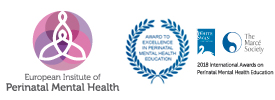
It is well known that pregnancy is a psychologically transforming event and that in some cases it may activate unexpected difficulties at an emotional level. It is also known that stress, anxiety and depression may impact the baby´s development, elevate the risk of preterm birth and of mental health issues in the postpartum. Not much attention is granted to this aspect of perinatal care – and what if it is a high risk pregnancy, in which mother is worried and fearful for her baby?
Around 2 out of 10 pregnancies are considered high-risk worldwide, with premature delivery, low infant birth weight and other poor outcomes more likely. In the United States, 10 percent of pregnant women require hospitalization because they have hyperemesis gravidarum, pre-eclampsia, kidney infections, gestational diabetes or are at risk for imminent delivery, among other conditions.
According to a study published in the journal Psychology of Women Quarterly, researchers from the University of Rutgers say keeping anxiety and stress to a minimum during pregnancy is important but is especially critical for high-risk pregnancies where it is believed to be a factor in premature birth.
But, is this possible? Little is known about how women with medically high-risk pregnancies manage their emotions while worried about their pregnancies.
The researchers interviewed 16 heterosexual women ages 21 to 42 from diverse racial and ethnic groups, hospitalized during high-risk pregnancies and found that trying to manage their emotions by themselves added an additional burden to an already stressful experience. The researchers analyzed how they tried to manage their emotions, what rationales they used and how they interpreted advice from health care providers and family members.
“We noticed a common theme among the women we spoke to — they were trying to force themselves to feel certain emotions like “thinking positive” while trying to perform mind tricks to get themselves there,” said Judith McCoyd, lead author and associate professor at the School of Social Work. “More surprisingly, the women informed us that they did not receive explicit advice on how to cope, think positive, or calm down.”
Aside from anxiety or depressive symptoms, the women experienced an inherent dilemma — needing to choose between two options and feeling that neither is good. This could include believing they must think positively to enhance fetal health despite their anxiety, sadness and their fears that this could harm the fetus; feeling responsible for housework yet being told not to do it; and needing medical treatments they feared would harm their fetus.
The women also stifled their emotional expression with their medical providers to enact being a good “mother” and to be a “good patient.” To try to manage their emotions, the women expended tremendous energy, leaving themselves depleted and less able to cope.
With little attention to women’s emotional experiences, even to the point of complimenting them as “good incubators,” health care providers may unintentionally shift emotional labor onto vulnerable women.
The researchers suggest that professional intervention using visualization, mindfulness, cognitive-behavioral work and/or Acceptance Commitment Therapy, a type of psychotherapy that helps you accept difficulties, may all be useful interventions to try with this vulnerable group.
The researchers also stated that women considering pregnancy should think about what emotional support they might receive if they have a high-risk pregnancy. Women can speak with their obstetrician-gynecologist about receiving consistent medical and psychosocial care, and ask for a health navigator, perinatal social worker or an integrated behavioral health specialist if they require hospitalization, McCoyd said.
Psychological attention is not something that women in high-risk pregnancies can give themselves; it should be an integral part of preventive health care during pregnancy.
Judith L. M. McCoyd, Laura Curran, Shari Munch. They Say, “If You Don’t Relax…You’re Going to Make Something Bad Happen”: Women’s Emotion Management During Medically High-Risk Pregnancy. Psychology of Women Quarterly, 2019; 036168431988319 DOI: 10.1177/0361684319883199
Rutgers University. “Women need professional emotional support during high-risk pregnancies, study finds: Urging women to think positive is only helpful when providing coping guidance and support.” ScienceDaily. ScienceDaily, 16 December 2019.







